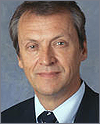Report Tracks UC's Performance for California

Robert C. Dynes
- • Degrees Awarded: During academic
year 2004-05, UC awarded 54,477 bachelor's, master's, doctoral and first professional
degrees. The number of bachelor's degrees awarded by the University has increased
18 percent over four years.
One-third of bachelor's and master's degrees and nearly 60 percent of doctoral degrees were awarded in mathematics, sciences and engineering, fields important to the state's work force needs. At the doctoral level, degrees awarded in mathematics, sciences and engineering have grown 15 percent over four years. - • Graduation Rates: More UC students
are completing their college education, and they are doing so at a faster
pace. Average time to degree at UC is 13 quarters (where a four-year degree
equals 12 quarters), and 80 percent of entering UC freshmen graduate within
six years. That figure compares to a national average of 58 percent among
freshmen at four-year institutions, according to the National Center for Education
Statistics.
These rates have shown substantial improvement over time. In 1984, 31 percent of entering freshmen graduated in four years, compared to 44 percent of those admitted in 2000; and 73 percent of the 1984 entering class graduated within six years, compared to the 80 percent figure for the 1998 entering class, the most recent data available.
Community college transfer students are similarly successful at UC. More than 91 percent of California Community College transfer students persist to a second year at UC, nearly 83 percent graduate within four years of transferring (compared to 73 percent for the 1985 entering class), and on average these students take 7.5 quarters at UC, or 2.4 years, to complete their degrees.
Few students leave the University in academic difficulty. Among students admitted as freshmen in 1998, after six years, only 4.8 percent had left in academic difficulty (defined as discontinuing enrollment without earning a degree and with a grade average below a C) and had not returned to the University. Similarly, after six years, only 4.7 percent of community college transfer students who entered in 1997 had left in academic difficulty and not returned. - • Community College Transfer:
UC has been working to improve community college articulation, which refers
to agreements that specify for students how a course they take at a community
college can satisfy a requirement at UC and smooth the path to a degree. All
UC general campuses have now established articulation agreements with each
of the 109 community colleges in the state (except newly opened UC Merced,
which has such agreements with 94 community colleges so far), helping students
navigate the process of preparing for a specific UC major and transferring
to the University.
- • Faculty Honors: Currently, 52
faculty and researchers affiliated with UC have won Nobel Prizes, including
19 since 1995; 54 UC faculty and researchers have won the National Medal of
Science since it was established by Congress in 1959; UC has 253 members of
the National Academy of Sciences, more than any other university in the nation;
and the UC faculty includes 382 members of the American Academy of Arts and
Sciences, 504 members of the American Association for the Advancement of Science,
and 120 members of the Institute of Medicine.
- • Technology Transfer: UC research contributes to the economic prosperity of California. In 2003-04, 1,196 inventions were reported by faculty and researchers at UC campuses, or an average of more than three each day. UC has received more patents than any university in the world. Royalty income from inventions that have been transferred to the marketplace brought $79 million to the University in 2003-04.